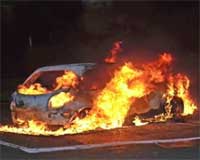Editor’s comment
What will be the defining image of this week’s civil unrest?
The burnt-out shell of a 140-year old furniture store in Croydon that had survived the blitz but fell on a night of violence and greed?
The injured young man, blood running from his head, who thought he was being helped by a group but was in fact being mugged?
Or will it be that of senior politicians on the streets and in TV studios around the country looking out of touch, out of their depth and increasingly out of control?
All of these images and more – already the more isolated troubles in north London last weekend seem like an age ago – will be replayed time and time again, damaging confidence in the police, further rupturing our social fabric and doing huge damage to Britain’s reputation internationally.
By tomorrow – and depending what else happens tonight – expect to see a new defining image: an empty Wembley Stadium. Around 70,000 tickets had been sold for tonight’s England-Holland friendly. With police resources so stretched, there was no choice but to call off the match. But it is the sort of decision that does global damage, especially as the Olympics looms into view.
Unlike many politicians, this industry’s mood chimes with that of the wider public.
It’s not just property that has been destroyed this week. Confidence in the authorities’ ability to protect assets has been, at best, shaken. The situation in London was brought back under some kind of control last night (it’s interesting how our definition of “control” has changed over the last week) but at what cost? Property owners in Manchester, Birmingham, Bristol and elsewhere would argue that they are paying the price.
Town-centre retailers – and the residential property owners above them – have been the most visible casualties. But offices and industrial units have been targeted too. And at a time of economic fragility the inevitable rise in the cost of insurance and security measures will undoubtedly destroy businesses. And, as British Property Federation chief executive Liz Peace said on an Estates Gazette video yesterday, in many cases it is small, community businesses that will pay the ultimate price.
The full damage – financial and social – of this week’s unrest will take time to assess. Riots 30 years ago in Toxteth and Brixton prompted radical thinking with Michael Heseltine penning his famous “It took a Riot” Cabinet paper, urging a programme of government engagement and intervention in urban areas, in response. Much has changed in the intervening 30 years. But like everyone else, this industry will need to be convinced that there is a willingness to think as radically this time around.
damian.wild@estatesgazette.com
Estates Gazette headed to south London to investigate how the riots of the past three days have impacted the retail sector.
Click to view the special report or watch the video on Estates Gazette’s Youtube channel.
joanna.bourke@estatesgazette.com











